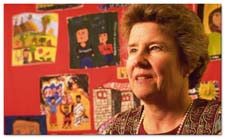
Main Menu ·
Search ·
Current Issue · Contact · Archives · Centennial · Letters to the Editor · FAQs
Profiles
Back to Promoting a National Love of Children
 |
Photograph by David Zadig
|
Katherine Merseth, executive director of the Harvard Project on Schooling
and Children, believes that children and their education should be everyone's
most urgent concern, a conviction that makes her a determined though tactful
proselytizer in championing that cause at Harvard. She has turned HPSC's
offices into an art gallery that displays children's artwork from schools
in the Greater Boston area.
Trained in theoretical mathematics, Merseth taught math in the Massachusetts
public school system before receiving her doctorate from the School of Education
in 1982. From 1983 to 1988 she directed the teacher-education program for
undergraduate and graduate students at Harvard. She also founded and was
the first director of the school's Mid-Career Math and Science Teacher Education
Program, whose mission is to attract professional scientists and mathematicians
to high-school teaching. She maintains a strong interest in schools and
teaching and would like to see Harvard become more active in offering its
expertise to teachers and administrators at local schools.
"I think one huge role for this University is to serve as a model
for professional training programs in education," she says. "When
we talk about serving the community, this involves connecting families and
communities and schools. I see very few programs in the country that are
training individuals for work in that very complex web."
David Kearns agrees. The former chairman and chief executive officer of
Xerox Corporation, a member of the executive board of HPSC, says, "If
we are to make a difference, we will do so only by combining the knowledge
and expertise of people in business, law, health, education, and government.
It will require the very best minds working on the toughest educational
issues in schools and classrooms across the country."
Merseth believes that addressing children's problems requires a diversity
of views that refiects the diversity of views in society. Unfortunately,
she observes, education issues are highly political; even so seemingly straightforward
a subject as reading levels becomes freighted with political overtones when
it gets tied to family and community issues. She thinks HPSC's most important
goals are the Core Curriculum course on children and the proposed concentration
in children's studies. These may do something to overcome what she calls
"the marvelous ability we have in our policies to ignore children.
The more students learn about children and children's issues, the more likely
we are one day to have citizens sitting in the seats of power who will be
informed and who will care about those issues."
Back to Promoting a National Love of Children
Main Menu ·
Search · Current Issue · Contact · Archives · Centennial · Letters to the Editor · FAQs

![]()

![]()